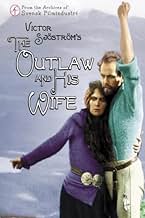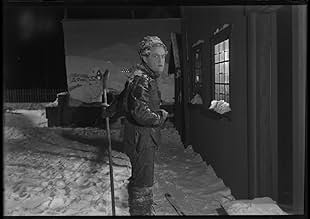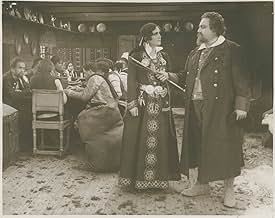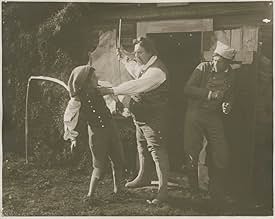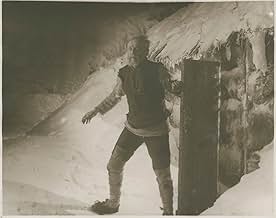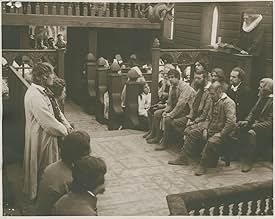IMDb-BEWERTUNG
7,1/10
2239
IHRE BEWERTUNG
Füge eine Handlung in deiner Sprache hinzuEjvind and his family are in need of food. So Ejvind seeks help from the rich priest next door. He refuses to help. Ejvind then steals a sheep from the priest, he is caught. But he escapes f... Alles lesenEjvind and his family are in need of food. So Ejvind seeks help from the rich priest next door. He refuses to help. Ejvind then steals a sheep from the priest, he is caught. But he escapes from prison, and becomes an outlaw.Ejvind and his family are in need of food. So Ejvind seeks help from the rich priest next door. He refuses to help. Ejvind then steals a sheep from the priest, he is caught. But he escapes from prison, and becomes an outlaw.
- Regie
- Drehbuch
- Hauptbesetzung
Walerie Alexandrow-Höök
- Berg-Ejvinds och Hallas dotter Tota
- (as Walerie Alexandrow)
Empfohlene Bewertungen
(1918) The Outlaw and His Wife/ Berg-Ejvind och hans hustru
SILENT DRAMA
Co-written, directed and starring Victor Sjöström, he plays an unknown drifter, Kari (Victor Sjöström) looking for work and ends up working at a farm, owned by Halla (Edith Erastoff). And as they begin to fall in love, it is then his past begins to catch up with him that his name is not Kari, but is really Eyvind suspected of escaping from prison. Adapted from the play "Eyvind of the Hills" by Jóhann Sigurjónsson.
A silent Swedish film that is reminiscent of a serious love story that has a complicated situation, that can be used as a basis for movies that come after it.
Co-written, directed and starring Victor Sjöström, he plays an unknown drifter, Kari (Victor Sjöström) looking for work and ends up working at a farm, owned by Halla (Edith Erastoff). And as they begin to fall in love, it is then his past begins to catch up with him that his name is not Kari, but is really Eyvind suspected of escaping from prison. Adapted from the play "Eyvind of the Hills" by Jóhann Sigurjónsson.
A silent Swedish film that is reminiscent of a serious love story that has a complicated situation, that can be used as a basis for movies that come after it.
It is a truism that Victor Sjostrom's films dramatise the conflict between nature and society, but his treatment is less simplistic than might be first apparent. For instance, society in 'The Outlaw and his Wife' is ruled by a brutal, land-grabbing Bailiff who whips servants for losing a sheep; but it is also a place rich in pageantry, costume and rite, where communities can express themselves.
Similarly, nature might be a site of freedom for social outsiders, a sustaining idyll for lovers, and an awe-inspiring backdrop, but it also overflows in the lonely vagrant who comes close to rape, or the cliff and snows that can kill.
Throughout Sjostrom shifts impressively between registers - nature as both real presence and symbolic backdrop; plot as both social depiction and spiritual journey - while retaining familiar action pleasures.
Similarly, nature might be a site of freedom for social outsiders, a sustaining idyll for lovers, and an awe-inspiring backdrop, but it also overflows in the lonely vagrant who comes close to rape, or the cliff and snows that can kill.
Throughout Sjostrom shifts impressively between registers - nature as both real presence and symbolic backdrop; plot as both social depiction and spiritual journey - while retaining familiar action pleasures.
The Outlaw and His Wife (1918) directed by Victor Sjöström is yet another impressive production in early cinema history.
The story revolves around a stranger who comes to work at a widow's (Halla's) farm. Halla and the stranger fall in love, but when he is revealed as Eyvind, an escaped thief forced into crime by his family's starvation, they flee and become two of the many outlaws of Iceland's mountains.
Victor Sjöström's early films are impressive in their own right. In The Outlaw and his Wife, he almost uses nature as a character, pressuring the humans of the film to the very brink of - and beyond - their moral values. This works effectively in driving a more abstract point of the film; what is one willing to do in order to ensure one's own safety and survival, and yet further abstract; what is good and evil as philosophical constructs?
It is similarly highly recommended for film buffs and those interested in cinema history just like Sjöström's earlier film Terje Vigen (1917), although The Outlaw and his Wife is not as contemporary as Terje Vigen. Lacking a score and being twice as long, it does not feel as focused although it definitely is more epic in its scale and production.
The story revolves around a stranger who comes to work at a widow's (Halla's) farm. Halla and the stranger fall in love, but when he is revealed as Eyvind, an escaped thief forced into crime by his family's starvation, they flee and become two of the many outlaws of Iceland's mountains.
Victor Sjöström's early films are impressive in their own right. In The Outlaw and his Wife, he almost uses nature as a character, pressuring the humans of the film to the very brink of - and beyond - their moral values. This works effectively in driving a more abstract point of the film; what is one willing to do in order to ensure one's own safety and survival, and yet further abstract; what is good and evil as philosophical constructs?
It is similarly highly recommended for film buffs and those interested in cinema history just like Sjöström's earlier film Terje Vigen (1917), although The Outlaw and his Wife is not as contemporary as Terje Vigen. Lacking a score and being twice as long, it does not feel as focused although it definitely is more epic in its scale and production.
The stunning Lappland scenery and seeing Victor Sjöström made this one enjoyable for me, despite a little creakiness in the early going. The setup, actually told in a flashback, reminded me of Les Miserables in that a man (Sjöström) turns to theft out of poverty, but instead of the local parson forgiving him as in that work, he jails him instead. Perhaps there is commentary on the church in this, and the need to show a little kindness to the less fortunate, since everything that happens to this decent guy stems from that incident. Anyway, he breaks out of jail, finds work on a farm, and falls in love with the owner (Edith Erastoff), but his past is never far behind.
The film gets good and the drama increases when the pair flee to the mountains, where they live a rugged life and have a baby girl. There are several moments at a cliff that are quite tense, and one that seems hard to fathom (I mean, really hard to fathom). Maybe the film shows us what desperation will drive people to, aside from the theft - jealousy, turning on one another, and acts you'd never think possible. Set against the grand scenery of those timeless mountains and waterfalls though, the human struggle seems especially small, even when it is gripping.
The pace is quite good at 73 minutes - intertitles are kept to a minimum, and the story, while simple, moves along nicely. At times it feels like the psychological drama is as claustrophobic as the wilderness is wide open. The film is obviously a bit stiff to modern eyes, but it seems clear that for 1918, it was ahead of its time.
The film gets good and the drama increases when the pair flee to the mountains, where they live a rugged life and have a baby girl. There are several moments at a cliff that are quite tense, and one that seems hard to fathom (I mean, really hard to fathom). Maybe the film shows us what desperation will drive people to, aside from the theft - jealousy, turning on one another, and acts you'd never think possible. Set against the grand scenery of those timeless mountains and waterfalls though, the human struggle seems especially small, even when it is gripping.
The pace is quite good at 73 minutes - intertitles are kept to a minimum, and the story, while simple, moves along nicely. At times it feels like the psychological drama is as claustrophobic as the wilderness is wide open. The film is obviously a bit stiff to modern eyes, but it seems clear that for 1918, it was ahead of its time.
7Foxx
This film was Victor Sjöströms international break-through and it's not hard to understand why. It wasn't the first time Sjöström had used the wild and unpredictable nature as an illustrator or commentator, but this time the scenery and the acting was in the same level of quality. A wonderful piece of art.
Wusstest du schon
- WissenswertesBased on the story of Eyvindur of the Mountains (1714-1783), an outlaw in Iceland who fled into the mountains with his wife around 1760 and remained there for twenty years.
- Alternative VersionenTurner Classic Movies has shown on TV a restored version copyrighted in 1968 by Svenska Filminstitutet (The Swedish Film Instute). The restoration credits are in Swedish, but some of the original cast and crew credits are in English. All intertitles are in English and the film runs 73 minutes.
- VerbindungenFeatured in Victor Sjöström - ett porträtt av Gösta Werner (1981)
- SoundtracksKung Kristian II, op. 27
Composed by Jean Sibelius (1898)
Top-Auswahl
Melde dich zum Bewerten an und greife auf die Watchlist für personalisierte Empfehlungen zu.
- How long is Berg-Ejvind och hans hustru?Powered by Alexa
Details
- Erscheinungsdatum
- Herkunftsland
- Offizieller Standort
- Sprache
- Auch bekannt als
- Berg-Eyvind und sein Weib
- Drehorte
- Nuolja, Abisko, Schweden(mountain scenery)
- Produktionsfirma
- Weitere beteiligte Unternehmen bei IMDbPro anzeigen
Box Office
- Budget
- 100.000 SEK (geschätzt)
- Laufzeit
- 1 Std. 12 Min.(72 min)
- Sound-Mix
- Seitenverhältnis
- 1.33 : 1
Zu dieser Seite beitragen
Bearbeitung vorschlagen oder fehlenden Inhalt hinzufügen

